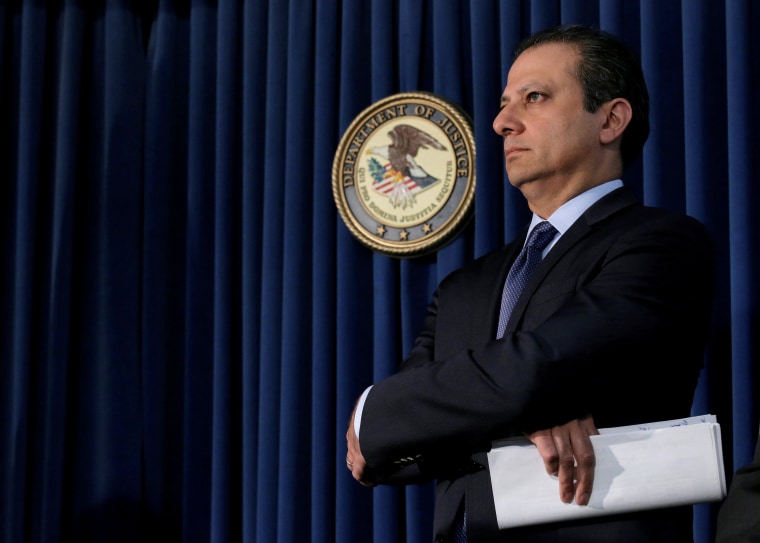In the Obama administration, Preet Bharara was the U.S. attorney for the Southern District of New York, which made him one of the most important and highest profile federal prosecutors in the United States, tackling case on matters ranging from terrorism to Wall Street to government corruption.
After the 2016 election, Bharara wanted to stay at his post, and both Donald Trump and Attorney General Jeff Sessions made the same commitment: the New York prosecutor could stay right where he was.
In March, however, Trump fired Bharara and 45 other federal prosecutors without explanation. Bharara, in his first television interview since his dismissal, sat down yesterday with ABC News' George Stephanopoulos and reflected on his experiences with Trump, starting with his reactions to Trump calling him while the Republican was still president-elect.
BHARARA: When I've been reading the stories of how the president has been contacting Jim Comey over time, felt a little bit like deja vu. And I'm not the FBI director, but I was the chief federal law enforcement officer in Manhattan with jurisdiction over a lot of things including, you know, business interests and other things in New York.The number of times that President Obama called me in seven-and-a-half years was zero. The number of times I would have been expected to be called by the president of the United States would be zero because there has to be some kind of arm's length relationship given the jurisdiction that various people had.STEPHANOPOULOS: What did he say?BHARARA: So he called me in December, ostensibly just to shoot the breeze and asked me how I was doing and wanted to make sure I was OK. It was similar to what Jim Comey testified to with respect to a call he got when he was getting on the helicopter. I didn't say anything at the time to him. It was a little bit uncomfortable, but he was not the president, he was only the president-elect. He called me again two days before the inauguration, again seemingly to check in and shoot the breeze and then he called me a third time when he -- after he became president and I refused to return the call.
The former U.S. attorney went on to note that Trump, through his outreach, appeared to be "trying to cultivate some kind of relationship" with the federal prosecutor.
Bharara said that this may not seem problematic to the public at large, but in the context of the Justice Department, where Bharara was in a position "hypothetically to investigate business interests and associates of the president," Trump's outreach was inherently problematic.
When the host asked if Bharara believes there's a connection between his firing and the fact that he had jurisdiction over Trump Tower, the former prosecutor demurred.
"I'm not drawing the connection," Bharara said. "I've lived long enough to know that anything is possible and we're seeing a lot of things going on now with respect to accusations that Jim Comey made under oath in a congressional hearing. So I don't know. To this day i have no idea why I was fired.... I have no idea."
There's no shortage of scandals surrounding Donald Trump and his White House, but I've long believed the firing of dozens of U.S. attorneys has the potential to be an important controversy, and Bharara's on-air comments yesterday reinforced those concerns. There's no fair-minded explanation for Trump trying to "cultivate some kind of relationship" with the federal prosecutor with jurisdiction over Trump Tower, assuring that prosecutor he could keep his job, and then firing him without explanation.
Indeed, the entire story is in need of far more scrutiny. Circling back to our previous coverage, three months after the 46 Obama-era federal prosecutors were told to submit their resignations and clean out their offices before close of business, the lingering questions still need answers.
Why was one U.S. attorney fired without explanation after being told he could stay? Did any of these prosecutors' dismissals relate to ongoing cases the White House wanted to derail? Why did nearly four dozen U.S. attorneys have to clean out their desks immediately?
Given the administration's ambitious law-enforcement agenda, why didn't Trump prioritize the nomination of new U.S. attorneys?
And of yesterday, we can add an even more salient line of inquiry: why did the president try to cozy up to one especially important prosecutor, and then fire him?
These are the sort of questions Congress might ordinarily ask, if oversight were still a priority on Capitol Hill.
Postscript: Whenever the subject comes up, Republicans are quick to note that the broader dynamic isn't necessarily unusual: new presidents replace U.S. attorneys with their own slate of federal prosecutors, and this has happened many times before. It wasn't controversial when President Obama replaced Bush's U.S. attorneys, the argument goes, so it shouldn't be controversial to see Trump replace Obama's.
The trouble is in the specific details. Modern presidents from both parties have handled the transition in prosecutors in a much more gradual and orderly way, with a process spanning months, and in some cases, years. U.S. attorneys working on big cases were told they could stay on, for example, and administration took care to avoid disrupting the system.
Trump and his team did the opposite. It's a mystery as to why.
